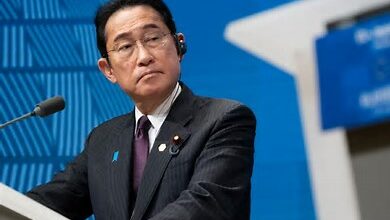‘There to die’: Nepali mercenaries fight for Russia in Ukraine
KATHMANDU: Nepali mercenaries are fighting for Russia in Ukraine. They were persuaded to kill far from their home in the Himalayas by promises of money and a passport, but injured returnees advise anybody considering joining the conflict to “don’t come.”
Although Nepali soldiers-for-hire can earn almost twice as much in a month as they might in a year at home, the working conditions are harsh, and many have lost their lives or suffered serious injuries.
“I saw my friends die in front of me,” Mr. Surya Sharma stated, requesting to go by a pseudonym for legal purposes.
“It’s likely impossible for Nepalis to comprehend the horror of the war.”
The 24-year-old was attacked by Russian forces while traveling to a front line in eastern Ukraine, not long after he completed basic training.
He remarked, “I thought my life was ending, that that was it, when the bombs and bullets were raining.” “I came to die there.”
Nepal has historically been a source of fierce troops to fight other people’s wars, with the British army’s Gurkhas being the most well-known example. The country combines harsh Himalayan topography with extreme poverty.
Nonetheless, only in the event of a formal official agreement—which only pertains to India and Britain—is it lawful for Nepalis to enlist in the armed forces of another country.
Russia has been using mercenaries since the beginning of its campaign in Ukraine, including the paramilitary outfit Wagner, which aborted last June.
The number of foreign combatants in their forces and the number of POWs they are detaining are not disclosed by Russia or Ukraine.
But since Russia attacked Ukraine two years ago, the Nepali government claims that more than 200 of its nationals have joined the Russian military.
According to Mr. Sharma, there may be ten times as many, comprising of ex-combatants from the Maoist movement, students, and perhaps troops.
“There must be 2,500 to 3,000 Nepalis now; we were among the early ones to join,” he remarked.
The Foreign Ministry in Kathmandu said that at least 12 Nepalis had died and that five more were being held as prisoners of war in Ukraine.
Returnees allege that the real death toll is far greater, and local media reports claim that Nepalis have also fought for Ukraine.
President Vladimir Putin of Russia has given Russian citizenship, which permits holders to work, in addition to monthly salaries as high as US$2,200 (S$3,000) in an effort to entice warriors.
That appeals to certain people in a nation that has one of the lowest GDPs per capita in Asia, according to the World Bank, at just over US$1,300.
One former veteran enlisted in July after seeing videos of Nepali recruits receiving military training in Russia on TikTok in 2023.
The 39-year-old, who asked to remain anonymous since his actions are against the law, told AFP, “It is a war, and we are taking a risk.”
Before getting injured and being forced to return to Nepal, the man—who had served in the Nepalese army for more than ten years—had amassed almost $15,000 in six months while working for the Dubai police. He is now using the money to construct a house.
“No one would leave Nepal if there were good employment opportunities,” he continued.
The 24-year-old Mr. Sharma’s legs are buried with metal bits that cause him excruciating anguish with every movement.
He claims that a Nepali agent tricked him.
Thousands of Nepalis go for work overseas each year; 400,000 of them do so legally, while many more do so illegally, and many of them pay agents thousands of dollars to make their travels easier.
Mr. Sharma took out a loan to travel to Russia on a student visa, only to find that he could not work and that the only employment available to him was fighting.
He remarked in his Kathmandu rental room, “I had loans to pay at home and couldn’t send money.”
He had no prior military experience, but he said, “I heard the money was good, so I decided to join the army.” My circumstances compelled me to, not because I wanted to.
Prior to beginning his two months of basic training, he had a medical exam.
“I worked for the government, but I’ve heard that there are also Nepalis fighting in private armies,” he remarked.
The 15 Nepali recruits got up at six in the morning to begin their drills.
He claimed, “We learned how to target drones, build bunkers, and fire positions.”
However, he continued, “the language is also a problem.” “It can be dangerous in a battleground when we don’t understand the instructions they give us.”
Sent to the battle lines in Ukraine, Mr. Sharma’s unit—six members of which were from Nepal and the majority were Russians—was ambushed before they even made it to Kupiansk in the east.
Mr. Sharma suffered injuries to his hands and legs, and several of his friends were murdered in explosions.
“It felt like a movie at times,” he remarked.
After spending several months in the hospital, he left to seek assistance from Nepal’s embassy in Moscow when his condition improved.
He remarked, “I just couldn’t get back” to the front. “I decided to take a chance and go back to Nepal, believing that I would either end up in jail or at home.”
In an effort to stop them from being recruited, Nepal has outlawed its nationals from holding any kind of employment in Russia or Ukraine.
In Nepal, at least 12 people have been detained for allegedly recruiting fighters for Russia.
Police believe that the recruits are frequently brought in through the United Arab Emirates or India, where they are taught complex lies to trick the authorities.
Nepal is a nation that values non-alignment and peace, according to Foreign Minister NP Saud, who spoke to AFP.
“We have asked for their immediate return and do not have an agreement with Russia.”
Requests for comment from the Russian embassy in Kathmandu were not answered.
One injured Nepali told AFP over the phone, speaking from his Russian hospital bed, to advise his people to avoid falling for the bait.
The 27-year-old claimed that “no matter how much you prepare, it does not work when the bombs fall and the drones attack.”
“I ask others not to attend.” AFP








